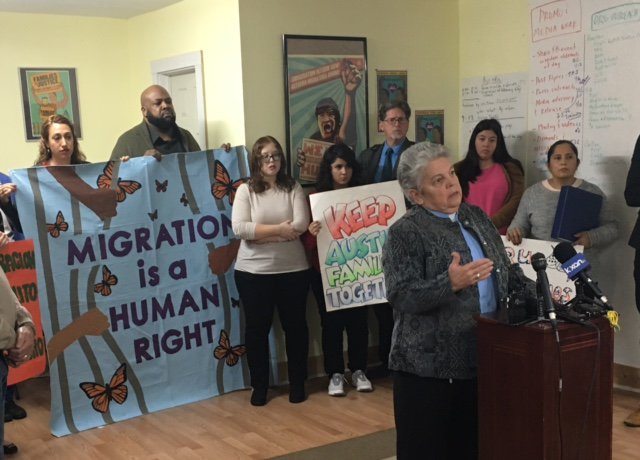
Activists Announce ‘Sanctuary in the Streets’ Ahead of Trump Inauguration
Austin advocates say they will put their bodies on the line to defend immigrants from Trump administration deportations.


Immigrant advocates gathered Monday morning in Austin to announce what they’re calling “Sanctuary in the Streets” — a city-wide, direct-action network that plans to defend undocumented immigrants from deportation raids under the incoming Trump administration.
“We need to show ICE [Immigration and Customs Enforcement] it’s not gonna be easy to just come in and haul people off indiscriminately,” said Reverend Babs Miller of St. Andrew’s Presbyterian Church. “They’re gonna need a search warrant and to follow proper procedures, and we’re gonna be there to resist as much as we can.”
Miller said the network — made up of immigrant advocates and activists, faith leaders and the local ACLU — has already trained more than 100 volunteers in “non-violent direct action” and plans to train about 400 more.
Alejandro Caceres of Grassroots Leadership added that the group is training people to be “the physical barrier between ICE and the person they want to raid.” Caceres said the network, which is divided into 10 districts, will maintain a hotline, (512) 270-1515, where people can report a raid in progress. Trained volunteers in the area will then be summoned to stand between ICE agents and the immigrant or immigrants targeted by deportation.
Caceres told the Observer they don’t know yet how fast response times will be, but they will be holding a practice run soon. Caceres explained that ICE has no authority to arrest American citizens, so ICE officials would have to depend on local law enforcement officials to arrest the network’s volunteers, making operations more costly and difficult.
“If immigration [agents] want to be seen with police officers arresting a bunch of nice, older church folks, that’s fine,” added Caceres. “But the public is going to see it, and more and more people will get involved.”
The city of Austin and Travis County have also pledged to defend immigrants. In December, in anticipation of the Trump administration, the Austin City Council voted to “find emergency funds” to expand the capacity of legal organizations to serve an additional 100 immigrants per month, according to KXAN.
In November, Travis County voters also elected Sally Hernandez as sheriff. Hernandez has promised to end collaboration between ICE and the Travis County jail. Like many jails, Travis County currently honors ICE detainers — meaning it extends detention of undocumented immigrants at ICE’s request so the agency may potentially deport them.
“At the local level, we can fight proactively for policies we believe in,” said Cristina Parker of Grassroots Leadership. “But at the state level, it’s about fighting against policies that would discriminate against and harm the immigrant community.”
State Senator Charles Perry, R-Lubbock, filed Senate Bill 4, which would force cities and counties to honor ICE detainers and withhold state funding from those who don’t. Governor Greg Abbott has said he will sign the bill.
The Sanctuary in the Streets effort is an extension of an existing sanctuary movement. Since the 1980s, progressive churches have shielded immigrants and refugees from deportation by allowing them to live on their premises, taking advantage of a long-standing ICE policy of avoiding “sensitive locations.” The movement has experienced a resurgence since 2014.
The Austin Sanctuary Network has won relief from deportation for Sulma Franco and Hilda Ramirez — both Guatemalan women.
“We’re adding onto the existing model,” Caceres told the Observer. “We are expecting sweeps and raids under Trump, so we need to get out there and put our physical bodies on the line to stop people from getting picked up in the first place.”


